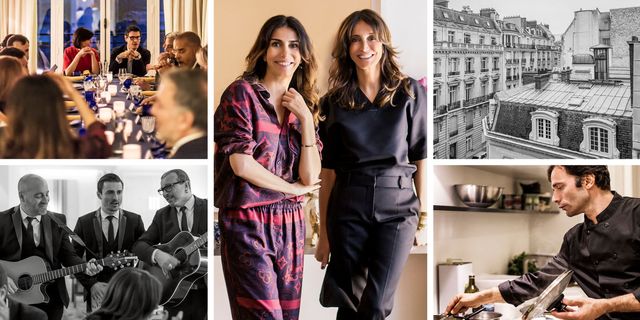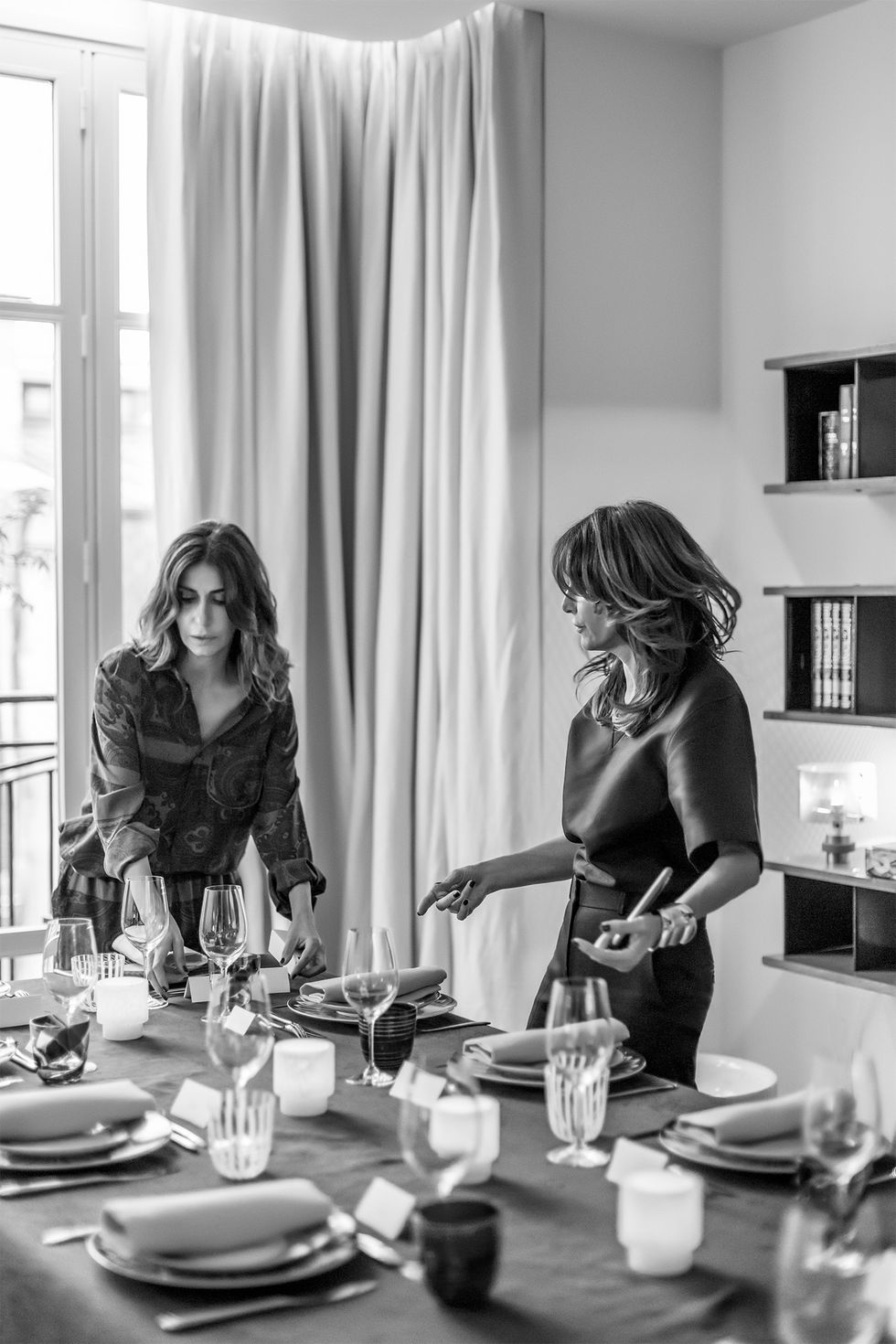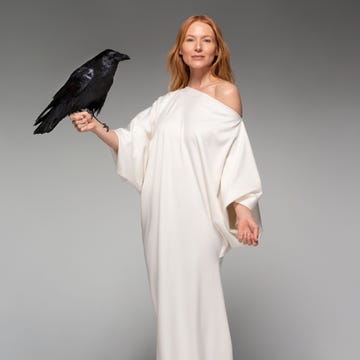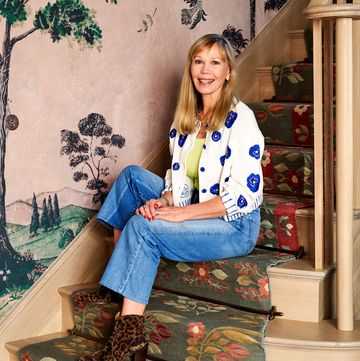This article originally appeared in the September 2016 issue of ELLE.
About an hour before 15 dinner guests are due to arrive, Evelyne Chetrite bursts into her sister Judith Milgrom's apartment in the Sixteenth Arrondissement of Paris. After happy hellos and kisses to Milgrom and chef Elio Bombace—the sisters, faithful clients of his Neapolitan bistro, Cibus, near the Palais Royal, have lured him over to cook—Chetrite surveys the long dining-room table. "Non, non, non!" she exclaims, as the remaining daylight streaming through the picture windows flashes off her big gold cuff bracelet. The dark chairs, interspersed with bright woven ones by Franz West, are bringing the room down. White chairs are brought up from storage; the lace tablecloth is changed to a less formal linen—softer against Milgrom's massive Charlotte Perriand bookshelf.
These changes are merely fine-tuning, as the apartment is difficult to improve upon. Designed by in-demand Parisian decorator Isabelle Stanislas, it's avowedly contemporary, with major-collector furniture, including a midnight-blue horsehair sofa and two chairs by Pierre Jeanneret, and oversize canvases by Richard Serra and Sterling Ruby. But neither of the two sisters, better known as the founders of the contemporary French labels Sandro (Chetrite) and Maje (Milgrom), got where they are by ignoring the details.
In France, where age-old heritage brands and luxury ateliers dominate the fashion landscape, and where self-made success has only recently been culturally celebrated, Sandro, Maje, and their dynamic founders stand out. Both have been fashion-obsessed since growing up in Rabat, Morocco—"I wasn't a great student," Milgrom says. "But," interrupts her sister, "she wore a full look to school every day"—and it was Chetrite who led the way into the business after the family (named Moyal) immigrated to Paris when she was 15 and her sister 10. Chetrite started out studying law but ended up helping her then boyfriend (now husband), Didier Chetrite, a clothing salesman in Paris's mass-market Sentier district, start his own brand. "He forgot that you couldn't just sell well, you had to sell something good," laughs Chetrite, who launched Sandro in 1984. Sporty, well-made, and well-priced, with a distinctly Parisian edge, it was one of the few affordable-chic options in an era before fast fashion. "As soon as I could, I wanted to be involved," says Milgrom, who worked summers for the Chetrites from age 16. "I remember going to fabric suppliers with a list of 100 clients, and Judith and I just had to charm them," Chetrite recalls.
In 1998, when Milgrom wanted to try a different sensibility—a bit flirtier, girlier—Maje was born. Entirely self-financed at their launches and run as completely separate businesses, the labels have become must-haves for young French professionals. In 2009, the sisters acquired fellow Parisian accessible-luxury brand Claudie Pierlot, forming the SMCP group; in 2010, LVMH and Florac acquired 51 percent of the entity, which helped the sisters grow their retail footprints internationally. (The companies have since sold their shares.) Sandro opened its first U.S. boutique in 2011 on Bleecker Street in New York, and Maje was picked up by Barneys that same year; today the former has 60 points of sale in the U.S. and the latter 49 (including, respectively, 17 and 13 freestanding boutiques). "Judith is my number one competitor, but she's also my best friend," Chetrite says.
"In the Sentier, it's 8 A.M. to 10 P.M., with a sandwich for lunch," Milgrom says of her industry's breakneck pace, but the weekend is another story. With their mother, husbands, and children—Evelyne's four, including son Ilan, who designs and runs Sandro's men's line; and Judith's two, and three stepchildren—the sisters celebrate every Shabbat together, alternating hosts. "We could have said no, it's not modern, we want to go away for the weekends," Chetrite says. "But it's so important for our health to take a step back." Milgrom adds, "Shabbat is our tradition, but also a way to unplug." Meal planning might start as early as Tuesday. "Because of that," Milgrom says, "we only do serious parties like this four or five times a year."
Everyone invited is a friend of at least one of the sisters, but not everyone knows each other, which is by design. "It's more fun that way," Chetrite says. Tonight includes contemporary-art gallerist Kamel Mennour, interior designer Sarah Lavoine, lawyer Julie Jacobs (executive vice president and general counsel for AOL), and Nicolas Gheysens from private equity firm KKR (which owns a minority stake in SMCP), whom the sisters have never seen in a social setting. (It turns out he's quite cool.) Laurent-Perrier rosé loosens up anyone who wasn't loose already, and an acoustic trio that the family saw perform in Nice does its part, too.
After a good hour of mingling, the guests are seated for fennel and artichoke salad, sautéed porcini mushrooms and asparagus, sea bass carpaccio, chickpea puree with lacinato kale, and tagliatelle with truffles. Chetrite and Milgrom get up and change places as the volume rises in proportion to the consumption of wine, and the band changes over from Bruce Springsteen and U2 covers to 1960s French garage-rock legend Jacques Dutronc. Bombace finishes up in the kitchen and comes out to a round of applause, which gets the guests up on their feet. Flush with praise, he's the one to get the dancing started, and it doesn't stop until 2 A.M.
Have thoughts? We want to hear from you. Contact us at elleletters@hearst.com.













